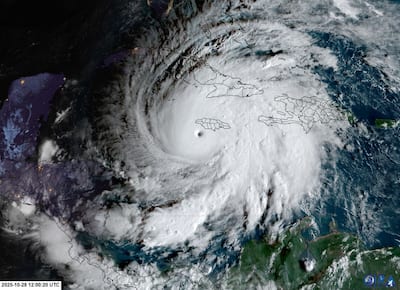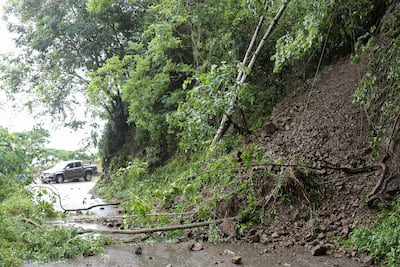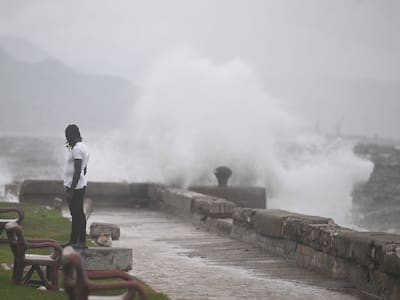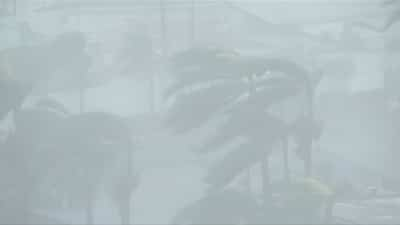The most powerful hurricane Melissa is heading towards Cuba after hitting Jamaica hard on Tuesday, which authorities are calling a “disaster zone” where several infrastructures were destroyed and sectors were flooded.
• Also read: Category 5 Hurricane: “We Just Lost a Window”: A Quebec Resident Witnessed Melissa's Arrival in Jamaica Live
• Also read: Hurricane Melissa: Quebecers hold on to Jamaica
• Also read: Dominican Republic on high alert after Hurricane Melissa
With sustained winds reaching 300 kilometers per hour, the then Category 5 hurricane, the highest on the Saffir-Simpson scale, hit western Jamaica hard at midday.
This is the strongest hurricane to hit Jamaica since weather records were set.
Prime Minister Andrew Holness declared the island a “disaster zone”.
St. Elizabeth Parish, located in the southwest of the island of 150,000 people and the breadbasket of Jamaica, was flooded, Desmond McKenzie, a local elected official, said during a news conference.
“The damage to St. Elizabeth is significant (…) the whole of Jamaica has suffered from the devastating effects of Melissa,” he added, adding that several hospitals were affected.
“Part of our roof was blown off, another part collapsed, the whole house was flooded. External structures such as animal enclosures or the kitchen were also destroyed,” Lisa Sangster, a resident of the area, told AFP.
After a slight loss of power and downgrading to category 4, Melissa around 21:00 began to leave Jamaica towards Cuba. GMT warns that it remains “extremely dangerous,” according to the U.S. National Hurricane Center (NHC).
In Cuba, residents flee the coast as it approaches Melissa. Local authorities have declared a “state of high alert” in six provinces in the country's east, and residents have been scrambling to stock up on food, candles and batteries since Monday.
“We bought bread, spaghetti, minced meat. This cyclone is serious, but we will cope with it,” said Graciela Lamaison, met by AFP in Santiago de Cuba, a province in the southeast of the island.
Crocodiles
In St. Catherine, central Jamaica, the Rio Cobre River overflowed its banks and strong winds blew away fences and roofs, an AFP photographer noted.
The capital, Kingston, has remained relatively safe, said Matthew Tapper, a 31-year-old resident. “My impression is that the worst is behind us,” he told AFP, but added that he was very concerned about the situation in rural areas.
Extremely strong squalls were expected across the country, as well as severe coastal flooding and heavy rainfall, which could cause catastrophic landslides.
Authorities have urged the public to be vigilant against crocodiles, which may pose a threat due to flooding.
In these types of disasters, “water kills many more people than wind,” meteorologist Kerry Emanuel reminded in advance, emphasizing the role climate change plays.
Warming seas lead to rapidly intensifying storms, as happened with Hurricane Melissa.
Refusal to evacuate
The hurricane, even before making landfall, killed three people in Jamaica, which was preparing for its arrival, as well as three people in Haiti and one in the Dominican Republic.
In Haiti, authorities ordered the closure of schools, businesses and administrations on Wednesday.
The United Nations announced Tuesday that it plans to airlift about 2,000 relief kits to Jamaica from Barbados as soon as possible.
The last major hurricane to hit Jamaica was Gilbert in September 1988. Less powerful than Melissa, it killed 40 people and caused enormous damage.
The country, whose economy is heavily dependent on tourism, has closed its international airport as well as upstream ports. If tourists managed to leave the area, another 25,000 people remained there, the government said on Tuesday.
Like residents, they were told to take shelter in hotel rooms or hurricane shelters and wait until the storm stopped moving through the area on Tuesday.
Hurricane Melissa is expected to make landfall in Cuba early Wednesday before moving closer to the southern Bahamas and the Turks and Caicos archipelago, a British territory.












